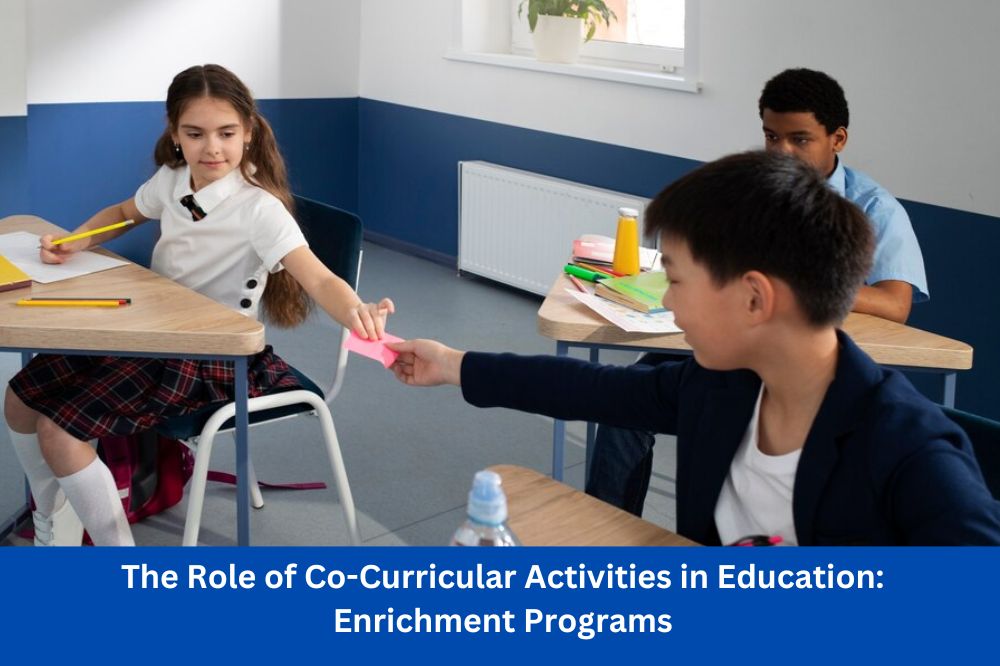Introduction
In the holistic development of students, co-curricular activities play a pivotal role, complementing the academic curriculum to cultivate a range of skills and attitudes. Banyan Tree School, recognised among the Top Schools in Chandigarh, emphasizes a balanced educational approach that integrates co-curricular activities as core components of its educational framework. This article explores the diverse range of enrichment programs at the School and their impact on student development, educational outcomes, and overall well-being.
-
The Spectrum of Co-Curricular Activities
The School offers a broad spectrum of co-curricular activities designed to cater to varied interests and talents of students. These include sports, music, arts, debate, science clubs, environmental clubs, and more. Each program is structured to not only provide enjoyment and a break from the academic routine but also to foster skills such as teamwork, leadership, responsibility, creative thinking, and personal initiative.
-
Sports and Physical Education
Understanding the importance of physical health and teamwork, the School has developed an extensive sports program. Sports activities such as soccer, cricket, basketball, swimming, and athletics are not only about competition but also about developing discipline, respect, and sportsmanship. The school’s sports teams regularly participate in inter-school competitions, often bringing home trophies that boost school pride and student confidence.
-
Music and Performing Arts
Music and performing arts are significant at the School, providing students with opportunities to explore their artistic talents. Whether it is through choir, band, drama, dance, or individual music lessons, students are encouraged to express themselves artistically. These activities are crucial for emotional expression and have been shown to improve academic performance by enhancing cognitive abilities and concentration.
-
Art and Craft
The art and craft programs at the School allow students to engage in creative expression and innovative thinking. Regular exhibitions and workshops with artists enhance students’ exposure to various art forms and techniques. This not only nurtures creativity but also helps in developing fine motor skills and aesthetic appreciation.
-
Debate and Public Speaking
Debate and public speaking forums cultivate critical thinking and effective communication skills. It hosts various debate formats and public speaking events, including Model United Nations (MUN), which simulate real-life negotiations and diplomatic discussions. These platforms prepare students for future leadership roles by boosting their confidence and argumentative skills.
-
Science and Technology Clubs
To foster a love for science and innovation, the School offers specialized clubs that engage students in hands-on activities and real-world problem solving. Robotics, coding, and environmental science clubs encourage students to apply theoretical knowledge in practical settings, promoting a deeper understanding of the subjects and awareness of global issues like sustainability.
-
Community Service and Social Responsibility
Community service programs are integral to the curriculum at the School, embedding the values of empathy, compassion, and civic responsibility. Students participate in various outreach activities, from environmental clean-ups to volunteering at local charities. These experiences teach students the importance of giving back to the community and the impact of collective efforts in making a difference.
-
Leadership and Student Councils
Leadership development is a critical focus, with the student council playing a central role in school governance. Through positions on the student council, students learn about responsibility, decision-making, and the democratic process. Leadership camps and workshops further support the development of these essential skills.
-
Integrating Co-Curricular Activities with Academic Goals
At School, there is a strong emphasis on integrating co-curricular activities with academic objectives. Teachers and program coordinators work together to align these activities with the curriculum, ensuring that students’ learning in co-curricular spheres supports and enhances their academic understanding.
-
The Impact of Co-Curricular Activities on Student Outcomes
Research and feedback at the School show that students engaged in co-curricular activities tend to perform better academically and show higher levels of motivation and school engagement. These activities provide a well-rounded education, preparing students not just for tests and exams but for life beyond school.
-
Evaluation and Continuous Improvement of Co-Curricular Programs
The School places a strong emphasis on the continuous evaluation and improvement of its co-curricular programs. Regular feedback from students, parents, and instructors helps refine these activities to better meet the educational and developmental needs of students. The school conducts surveys and organizes focus groups to gather insights that drive program enhancements, ensuring that co-curricular activities remain dynamic and responsive to the evolving educational landscape.
-
Encouraging Parental and Community Involvement
Involvement of parents and the wider community in co-curricular activities is another key strategy at the School. Parents are invited to attend performances, matches, and exhibitions, celebrating the achievements of students and reinforcing the community’s support for the educational process. Partnerships with local organizations and experts also enrich the co-curricular offerings, providing students with access to additional resources and learning opportunities outside the traditional school environment.
-
Interdisciplinary Learning Through Co-Curricular Activities
The School leverages co-curricular activities to promote interdisciplinary learning, where students apply knowledge from multiple subjects in a cohesive manner. For instance, a project in the environmental club might combine biology, chemistry, and geography to address local environmental issues, fostering a holistic understanding and appreciation for the interconnectedness of different academic disciplines.
Conclusion
Co-curricular activities are not peripheral but central to the educational philosophy at Banyan Tree School, which is One of the Top 10 Schools in Chandigarh. By providing a diverse range of programs and ensuring their integration with academic learning, the school fosters an environment where every student can discover and develop their interests and talents. This approach not only enhances educational outcomes but also supports the personal growth and well-being of students, making it a leader in holistic education.

